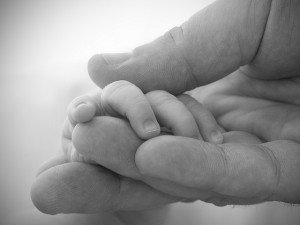Becoming a dad before the age of 25 is linked to a heightened risk of dying early in middle age, according to new Finnish research.

The authors of the new study looked at over 30,000 men who became fathers by the age of 45, and found that younger dads had poorer health and died earlier than those who delayed fatherhood. The research is published in the Journal of Epidemiology & Community Health.
Men who were dads by the time they were 22 had a 26% higher risk of death in mid-life than those who had fathered their first child when they were 25 or 26. At the other end of the scale, those who became dads between the ages of 30 and 44 had a 25% lower risk of death in middle age.
The researchers also undertook a further analysis in a sample of 1124 siblings, to tease apart social and genetic factors, and found similar results.
“The findings of our study provide evidence of a need to support young fathers struggling with the demands of family life in order to promote good health behaviours and future health,” write the authors.
“The promotion of good health behaviours in young fathers could also support healthy behaviour in their children.”
You can read more about the study, including a full media release, on Scimex.org.
The Science Media Centre collected the following expert commentary.
Prof Thomas Lumley, Professor of Biostatistics, University of Auckland, comments:
“This study compares pairs of men from the same family who had their first child at different ages, and so the correlations it finds cannot be due to family socioeconomic background and are unlikely to be due to genetics. For that reason, the results add support to the correlations between early fatherhood and earlier death in previous studies. It could still be that personality traits related to becoming a father early are also related to worse health in middle age, as the researchers admit in the paper.
“If these are really effects of early fatherhood, they are quite large — about 3 premature deaths for every 200 early fathers, with “early” defined very broadly — and could suggest that increased support for young families would provide population health benefits.”
Our colleagues at the UK SMC collected the following expert commentary.
Prof Kevin McConway, Professor of Applied Statistics, The Open University, said:
“This is a good study using a large amount of data. But we’ve got to be very careful about what it is telling us, and particularly about what it might imply about how to support fathers in the future.
“One problem is that it is an observational study and it’s always hard to work out what is causing what from observational studies. The authors are careful in their wording, and don’t go further than saying that the findings suggest the association between young fatherhood and midlife mortality is likely to be causal. The basic problem is that we can’t be sure whether it is the early fatherhood causing the increased mortality, in that if the young fathers had started their families later in life but nothing before that changed, then fewer of them would have died in middle age. Maybe there is something else that caused them to have children when they were young, and independently caused more of them to die in middle age.
“The researchers controlled for various factors in adult life, and what’s new about this study is that they also controlled for common experiences in early life by comparing brothers in their statistical analysis. But, as the research report says, this does not allow for characteristics in childhood that were not shared by brothers in the same family. Suppose one brother has his first child in his early twenties, and another brother doesn’t have his until he is in his thirties. This difference can’t be explained by the experience they have in common. Could it be explained by something else, or is it just random? And if it can be explained by something else, perhaps that something else is the cause of the difference in death rates, and not the age when they had their first children.
“The report suggests that difference in personality between brothers might be such a confounding factor, and it’s not difficult to think of other plausible ones – perhaps difference in family circumstances. Maybe the brothers’ parents split up but only after one of the brothers had left home. Maybe the family was financially poor when one brother was young, but was doing better when the other brother came along. We can’t tell from this study whether any of these things really had an effect on the age when brothers had their children, or on their later health. But while the possibility remains that they have an effect, we can’t be sure that it is the early parenthood that is causing later health problems.
“Another problem is that, even if we somehow could know that the relationship was causal, we still don’t know what, if anything, to do about it. The researchers suggest that the increased mortality might be due to extra responsibilities of parenthood and the accumulation of stresses of life. That’s plausible. But these fathers grew up in Finland during and soon after the Second World War. Social conditions in, say, Britain now are very much different from their experience. We just don’t know whether the findings would be the same for young men nowadays, in Finland or anywhere else.
“As the researchers write in their paper, “More research is needed that considers the processes leading to the excess mortality of young fathers at later stages of life.” It does make sense to suggest, on the basis of this study and other research, that there is a need “to support young fathers struggling with the demands of family life” to promote future health. But this study throws very little light on exactly how to do that.”